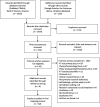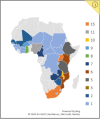Evidence map of knowledge translation strategies, outcomes, facilitators and barriers in African health systems
- PMID: 30732634
- PMCID: PMC6367796
- DOI: 10.1186/s12961-019-0419-0
Evidence map of knowledge translation strategies, outcomes, facilitators and barriers in African health systems
Abstract
Background: The need for research-based knowledge to inform health policy formulation and implementation is a chronic global concern impacting health systems functioning and impeding the provision of quality healthcare for all. This paper provides a systematic overview of the literature on knowledge translation (KT) strategies employed by health system researchers and policy-makers in African countries.
Methods: Evidence mapping methodology was adapted from the social and health sciences literature and used to generate a schema of KT strategies, outcomes, facilitators and barriers. Four reference databases were searched using defined criteria. Studies were screened and a searchable database containing 62 eligible studies was compiled using Microsoft Access. Frequency and thematic analysis were used to report study characteristics and to establish the final evidence map. Focus was placed on KT in policy formulation processes in order to better manage the diversity of available literature.
Results: The KT literature in African countries is widely distributed, problematically diverse and growing. Significant disparities exist between reports on KT in different countries, and there are many settings without published evidence of local KT characteristics. Commonly reported KT strategies include policy briefs, capacity-building workshops and policy dialogues. Barriers affecting researchers and policy-makers include insufficient skills and capacity to conduct KT activities, time constraints and a lack of resources. Availability of quality locally relevant research was the most reported facilitator. Limited KT outcomes reflect persisting difficulties in outcome identification and reporting.
Conclusion: This study has identified substantial geographical gaps in knowledge and evidenced the need to boost local research capacities on KT practices in low- and middle-income countries. Evidence mapping is also shown to be a useful approach that can assist local decision-making to enhance KT in policy and practice.
Keywords: African health systems; Knowledge translation; evidence map; health policy; knowledge translation strategies; mapping review; policy-making.
Conflict of interest statement
Ethics approval and consent to participate
Not applicable.
Consent for publication
Not applicable.
Competing interests
The authors declare that they have no competing interests.
Publisher’s Note
Springer Nature remains neutral with regard to jurisdictional claims in published maps and institutional affiliations.
Figures





Similar articles
-
Outcomes of an integrated knowledge translation approach in five African countries: a mixed-methods comparative case study.Health Res Policy Syst. 2024 Dec 10;22(1):162. doi: 10.1186/s12961-024-01256-x. Health Res Policy Syst. 2024. PMID: 39658798 Free PMC article.
-
Review of published evidence on knowledge translation capacity, practice and support among researchers and research institutions in low- and middle-income countries.Health Res Policy Syst. 2020 Feb 10;18(1):16. doi: 10.1186/s12961-019-0524-0. Health Res Policy Syst. 2020. PMID: 32039738 Free PMC article. Review.
-
Institutional capacity for health systems research in East and Central African schools of public health: knowledge translation and effective communication.Health Res Policy Syst. 2014 Jun 2;12:20. doi: 10.1186/1478-4505-12-20. Health Res Policy Syst. 2014. PMID: 24890939 Free PMC article.
-
Indicators to evaluate organisational knowledge brokers: a scoping review.Health Res Policy Syst. 2020 Aug 24;18(1):93. doi: 10.1186/s12961-020-00607-8. Health Res Policy Syst. 2020. PMID: 32831095 Free PMC article.
-
Protocol of a scoping review on knowledge translation competencies.Syst Rev. 2017 May 2;6(1):93. doi: 10.1186/s13643-017-0481-z. Syst Rev. 2017. PMID: 28464858 Free PMC article.
Cited by
-
Exploratory factor analysis of constructs used for investigating research uptake for public healthcare practice and policy in a resource-limited setting, South Africa.BMC Health Serv Res. 2023 Dec 15;23(1):1423. doi: 10.1186/s12913-023-10165-8. BMC Health Serv Res. 2023. PMID: 38102600 Free PMC article.
-
Competency profiles for evidence-informed policy-making (EIPM): a rapid review.Health Res Policy Syst. 2023 Feb 8;21(1):16. doi: 10.1186/s12961-023-00964-0. Health Res Policy Syst. 2023. PMID: 36755283 Free PMC article. Review.
-
Determinants of evidence-based practice among health care professionals in Ethiopia: A systematic review and meta-analysis.PLoS One. 2023 Nov 9;18(11):e0293902. doi: 10.1371/journal.pone.0293902. eCollection 2023. PLoS One. 2023. PMID: 37943797 Free PMC article.
-
Health System Resilience: Withstanding Shocks and Maintaining Progress.Glob Health Sci Pract. 2022 Sep 15;10(Suppl 1):e2200076. doi: 10.9745/GHSP-D-22-00076. Print 2022 Sep 15. Glob Health Sci Pract. 2022. PMID: 36109051 Free PMC article.
-
PROTOCOL: Systematic review of methods to reduce risk of bias in knowledge translation interventional studies in health-related issues.Campbell Syst Rev. 2022 Apr 12;18(2):e1236. doi: 10.1002/cl2.1236. eCollection 2022 Jun. Campbell Syst Rev. 2022. PMID: 36911351 Free PMC article.
References
-
- Green A, Bennett S. Sound Choices: Enhancing Capacity for Evidence-informed Health Policy. AHPSR Biennual Review. Geneva: WHO, Alliance for Health Policy and Systems Research; 2007.
Publication types
MeSH terms
LinkOut - more resources
Full Text Sources
Medical

